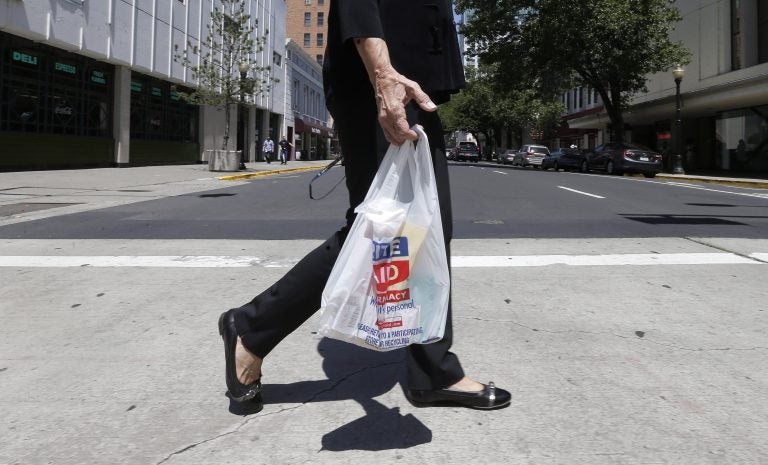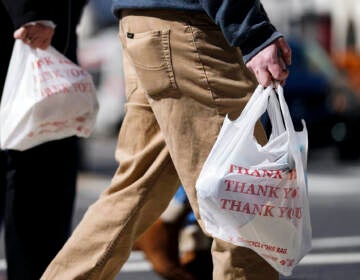Happy Earth Week: Philly delays plastic bag ban due to coronavirus
The bag ban’s July start date is “no longer realistic,” Mayor Jim Kenney said. He made the announcement on Earth Day — poor timing, he acknowledged.

A woman walks with a plastic bag in this file photo. (AP Photo)
Philadelphians happy to bid goodbye to single-use plastic bags will have to wait until 2021 for the city’s ban to take effect.
The regulation’s planned July start date is “no longer realistic,” Mayor Jim Kenney said on Wednesday. The bag ban will now take effect on January 1, 2021, with enforcement of the prohibition starting on April 1, according to the city.
The announcement came on Earth Day — ironic timing, Kenney acknowledged.
“This is not an announcement we want to make during Earth Week. We know the climate crisis and plastic pollution remain two very serious threats to our planet and society, even during the global pandemic,” the mayor said.
Kenney described the six-month delay as a move to help businesses battered and reeling from disruptions caused by the coronavirus pandemic. He said the decision was made as part of the city’s “commitment to ensure that businesses are as supported as possible when they reopen.”
Paper bags are more expensive than plastic bags, a cost that retailers were loath absorb even before the pandemic.
The bill to eliminate the use of single-use plastic bags in stores, restaurants, and delivery services passed last year in December after major adjustments. The bill was introduced by City Councilmember Mark Squilla in June as the fourth attempt in 12 years to ban plastic bags.
Plastics industry links reusable bags to COVID-19
The plastics industry has been pushing the delay of single-use plastic bags all across the country arguing they’re safer than reusable bags during the coronavirus pandemic.
In March, Politico obtained a letter from the Plastics Industry Association requesting the U.S. Department of Health and Human Services to speak out against bans “and help stop the rush to ban these products by environmentalists and elected officials that puts consumers and workers at risk.”
There is no link between reusable bags and COVID-19.
Still, cities and states across the country have been delaying plastic bag bans over the last few months. New York State postponed enforcement from March to June, last week.
Environmentalists say the city’s decision is unfortunate, especially on Earth Day.
“It is so disappointing that of all possible days, city officials chose the 50th anniversary of Earth Day to announce a significant delay of the most important environmental law passed in Philadelphia in a long time. This is ill-timed and tone-deaf on this special day,” said PennEnvironment’s executive director David Masur.
Plastic bags are one of the most littered items on the streets of Philadelphia, according to the city’s Zero Waste and Litter Cabinet. They’re not recyclable curbside and take about 500 years to break into smaller pieces. Businesses give away about one billion plastic bags in Philadelphia per year, according to estimates by the Clean Air Council.
Mayor Kenney marked Earth Day with several other announcements with more positive messages to the environmental movement — the release of the city’s Office of Sustainability Greenworks Review and the reopening of Solarize Philly.
That program incentivizes solar energy use with grants that include financing to low and moderate-income households with no upfront cost and utility bill savings from year one.
City’s air is 25% cleaner since coronavirus restrictions
The city’s Department of Public Health took advantage of the city’s 50th Earth Day to announce that Philadelphia air is significantly cleaner in the wake of the coronavirus shutdown.
According to a report from the city, the levels of nitrogen dioxide dropped about 22% compared to the month before the order. Dangerous fine particulate matter levels fell about 18% and carbon monoxide dropped by 25%. When breathed in, these toxins can trigger asthma and other respiratory illnesses.
“While it is understood that maintaining this level of shutdown is inadvisable and dangerous, the Health Department maintains that there is something to be learned from it. Reducing the number of cars and trucks on the road and the amount of pollution from industrial point sources pays dividends in air quality,” the report concludes.
WHYY is your source for fact-based, in-depth journalism and information. As a nonprofit organization, we rely on financial support from readers like you. Please give today.






![CoronavirusPandemic_1024x512[1]](https://whyy.org/wp-content/uploads/2020/03/CoronavirusPandemic_1024x5121-300x150.jpg)

